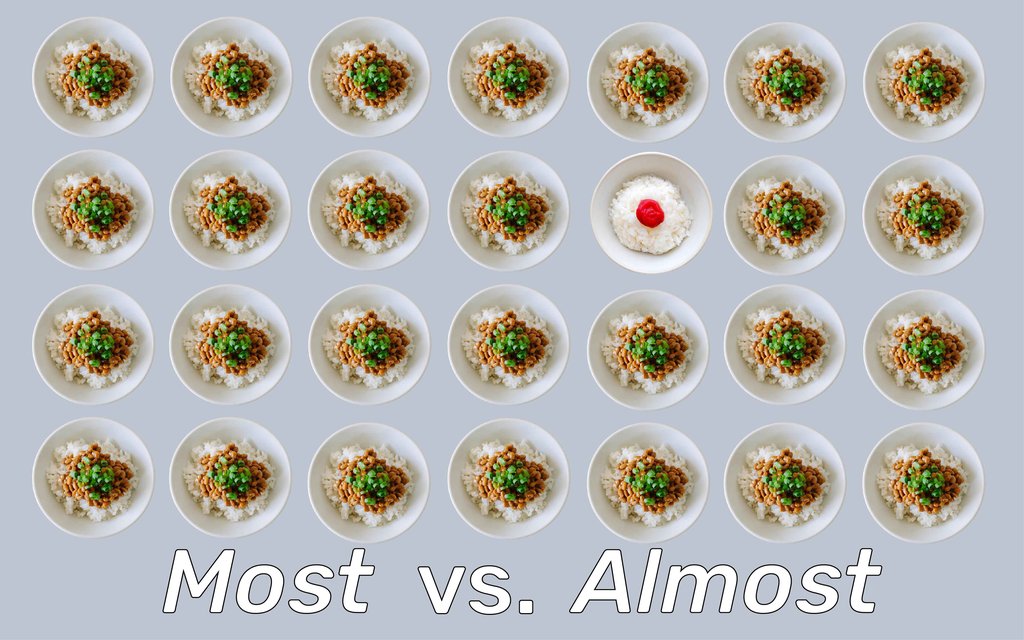“Most”と“Almost”って何が違う?ネイティブはどう使い分けてるの?“Most” vs. “Almost”: How to Use Them Like a Native
「ほとんど」を意味する“most”と“almost”。見た目も発音もそっくりなため、ついつい使い分けを知らずに同じように使ってしまいがち…。しかし日常やビジネスでも非常によく使うので、正しい使い方を知っているととっても便利!このブログでポイントを押さえて、あなたの英語をレベルアップさせましょう!

想像してみてください。あなたはカフェにいて、英語を話す外国人の友人たちと、日本の食文化について話しています。あなたは、あの独特な香りがするねばねばした発酵大豆、つまり、多くの日本人が大好きな納豆について、友人たちに話したくなりました。そして彼らが驚くのを予想しながらこう言いました。“Almost Japanese people eat fermented soy beans!”(ほとんどの日本人は発酵させた大豆を食べるんだよ!)友人たちは困惑した表情を浮かべました。そのときあなたは、それが単に、多くの日本人が“腸活”でお馴染みのこの発酵食品を食べているからだけではないと気づきました。他にも何かおかしな点があるのです。
では、何が間違っているのでしょうか。実はあなたは、“most”と“almost”を混同するという、非常によくある間違いにひっかかっているのです。これらの単語は、綴りも発音もとてもよく似ていますが、実際は大きな違いがあります。それはまるで、“わさびとアボカド”を間違えるくらい、異なっているのです。(これらを間違えるのは、私は決してお勧めしませんけどね。)
もし、“Most Japanese people eat fermented soy beans.”と言っていたら、友人たちの反応はきっとあなたの予想通りになっていたでしょう。それでは、いつ“most”を使い、いつ“almost”を使うのか、これから一緒にその違いを見ていきましょう。今後、英語で会話をする際や、あるいは英検やTOEICなどの試験においても、きっと役立つことでしょう。
“most” は、大部分のことについて話すときに、名詞と一緒に使いましょう
“most”は、何かの大部分について話すときに使います。つまり「多数」や「大部分」を意味します。分かりやすく、日本での米の消費者を例にとってみましょう。“Most Japanese people eat rice.”と言うと、日本の人口の50%以上が米を食べる、という意味です。きっとこの意見に反対する人は、まずいないでしょう。もちろん米を食べない人もいますが、ここでは一旦例外とします。
“most”を使った例文:
Most people don’t like stormy weather, but I love the thunder and lightning.
Jenny hates cheese in most dishes, but she loves it on pizza.
Most cats hate water. My cat loves baths, though.
大部分について話すときに“almost”は使えるのでしょうか?
もちろん、“almost”を使って大部分を表現することは可能ですが、“all”や他の限定詞と組み合わせる必要があります。例えば、“Almost Japanese people eat rice.”ではなく、“Almost all Japanese people eat rice.”が正しい表現です。また、“Almost everyone in Japan eats rice.”と表現することもできます。これは、その集団のほぼ全員が含まれることを示すと同時に、少数の例外があるかもしれないということを意味しています。
“almost”を他の限定詞と組み合わせて使うことで、集団全体にとって、何かや、何らかの状態がとても近いということを表現することができます。何かの集団・集合について、“almost”を使って表現したいときは、“all”や“nobody”などの別の単語が必要だということを忘れないでくださいね。これらの単語を一緒に使うことで、あなたの言いたいことが正確に伝わり、ネイティブスピーカーのように話すことができます。また、“almost”は、形容詞、副詞、不定代名詞などと組み合わせることができます。
使用頻度の高い組み合わせ:
- almost all
- almost every
- almost everybody
- almost everywhere
- almost nobody
- Almost never
- almost none
- almost nowhere
大部分について話す場合の“almost”を使った例文:
Almost everyone passed the test.
Almost all cities have a business district.
I almost never eat steak, but I can’t say “no” to Hida beef.
Almost no one wants the center seat on an airplane.
You can find interesting people almost everywhere in the world
In Japan, almost every roadside station sells fresh vegetables grown locally.
起こりかけていることについて話すときは“almost”を使いましょう
大部分を意味する“most”とは異なり、“almost”は、100%ではないがほぼ終了している、または、ほぼ完成していることについても表現することができます。“almost”は、「ほぼ」または「近い」という意味ですが、「完全に」という意味ではなく、“何かが起こりかけているが、完全には実現していない”という場合に使われます。
では、“most”とはどう違うのか、“almost”を使った例文を見てみましょう:
“I’m almost ready to go.” 私は、あと上着を羽織るだけです。
“She almost crashed her car.” 彼女は間に合い、止まりました。
“I’m almost finished with the report.” 私はもう一度、間違いがないか読み直すだけです。
動詞と一緒に“almost”を使う場合
動詞と一緒に使う場合、“almost”は、ある動作がもう少しで起こりそうになったが、完全には完了しなかったということを意味します。その出来事がどれだけ実現に近いか、ということを強調します。
“almost + 動詞”の例文:
Nana almost passed Eiken Grade 1. She failed by just two points.
I almost missed my airplane. I arrived just as they were closing the doors.
That dog almost got hit by a car. It ran across the main road, but luckily, it got across safely.
Jones almost won the race, but Scott came from behind and beat him by two seconds.
The governor was almost killed in the assassination attempt, but luckily she survived the attack.
Traffic was terrible this morning, so Joe was almost late to work. Luckily he arrived just on time.
The little girl almost cried when the doctor gave her the injection. Her lip quivered, but there were no tears.
The fire was terrible. We almost didn’t make it out in time.
形容詞と一緒に“almost”を使う場合
“almost”が形容詞を修飾する場合、何かがその性質や状態に近いが完全ではないことを意味します。
例えば
- “almost full” ほぼ満杯ですが、まだ少し空間が残っているということです。
- “almost perfect” とても良いですが、少し欠点があるということです。
- “almost ready” ほぼ準備完了ですが、最後の仕上げがまだ必要だということです。
いずれの場合も“almost”が表すのは、その形容詞が意味する状態に極めて近いところにいるがまだその状態には至っていない、ということです。
“almost + 形容詞”の例文:
Wait just a minute, please. I’m almost ready.
I’m almost finished preparing my presentation. I just have to check my PowerPoint slides.
Our safety tests on the new E.V. are almost complete. We can start marketing it soon.
In winter, it’s cold outside, but in the greenhouse it’s almost hot.
※greenhouse=ビニールハウス
名詞と一緒に“almost”を使う場合
“almost”は名詞、量、概念を修飾し、「ほぼ」という意味になりますが、「完全に」という意味にはなりません。私はよく、ネイティブ・スピーカーではない人が、 “almost”の後に限定詞(前述)を付け忘れる間違いを耳にします。例えば、生徒さんが、“Almost adults have to work to survive.”のように間違えてしまうのです。正しくは、“Almost all adults have to work to survive.”や、“Most adults have to work to survive.”となります。一方で、“Luna is almost an adult. She will be 19 on her next birthday.”と言うと、ここでは文字通り、“almost an adult”は“まだ未成年の若者”を意味します。
“almost + 名詞”の例文:
It’s almost time to go. We have to leave in 5 minutes.
It took almost 10 hours to drive from Nagoya to Fukuoka.
The shipment was almost a week late. It was supposed to arrive on Monday, but it didn’t arrive until Friday.
My package was almost a week late. It was supposed to be delivered on Monday, but it didn’t arrive until Friday.
/Almost everyone was happy to hear the news of Monica’s engagement. Her ex-boyfriend was pretty upset, though.
I finally got a shower after hiking in the jungle for a week. I feel almost human again.
まとめ
あなたが納豆好きでも、そうでなかったとしても、何かの大部分について話すときには、“most”か“almost all”を使うということを覚えておいてくださいね。 そして、もう少しで実現しそうなことについて話す場合は、“almost”を使いましょう。“most”と“almost”の違いを覚えておけば、 さらに自信を持って、ネイティブスピーカーのように話すことができるでしょう。
さらに、“most”と “most of”の違いについても理解を深めたいという方は、次回のブログレッスンをぜひご覧くださいね!
あなたの英語力をさらに向上させるために、知識の詰まった役立つヒントやアドバイスをお探しの方は、ぜひ私たちの他の無料ブログレッスンもご覧ください。また、2週間に1度の学習サポートメールでは、役立つ学習コンテンツや最新のスクール情報などをお届けしています。ご希望の方は、[email protected]までメールにてご連絡くださいね。ご自身の語学学習をさらに一歩先へ進めたいという方は、50分無料レベルチェックと50分無料体験レッスンへぜひお越しください。あなたの成功を全力でサポートさせていただきます!
あなたは編集者です
次の文章を校正してみてください。どれが正しくて、どれが間違っているでしょうか。間違いのある文章を正しく直してみましょう。
- Almost visitors to Japan are interested in Japanese culture.
- Most people look forward to time off on weekends.
- Almost everyone in my department has been transferred abroad for work.
- Most of students participate in sports or clubs after school.
- Joe most hit the car in front of him because he was texting while driving.
- I have toast and coffee almost of every morning.

